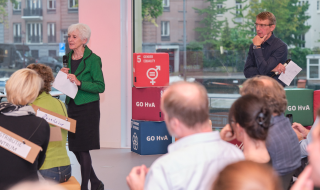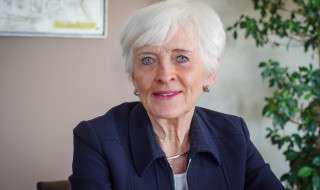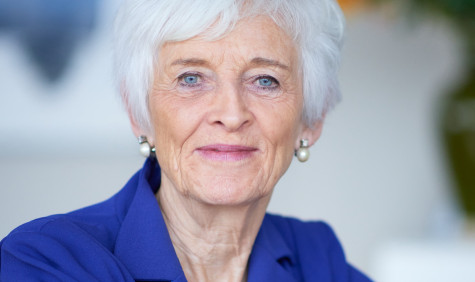"An independent party can join forces, lead the way and follow through"
"Educational institutions can play a crucial role in sustainability"
How do you get an entire chain or region to become more sustainable? And what role can technology play in this? Tackling big challenges like these energises Jacqueline Cramer, professor of Sustainable Innovation at Utrecht University. "I see so much innovation, that gives me hope."
From the very beginning of her career, the environment was the common thread. "I chose to study biology in 1970 because I wanted to contribute to solving the environmental problem. But there were no subjects in that field at all yet. It covered zoology and botany, but not the relationship with pollution. I had to scrape to find something related to this big issue. For instance, I worked for a while in an apple orchard on biological control of spider mites. Only in my final year could I follow the subject of environmental science. I am delighted that this subject now has many variants."
Relationship with society
She herself has also contributed to the development of the discipline. After graduating, she became a lecturer in 'biology and society', a subject she set up with a colleague at the University of Amsterdam. "We thought reflection on our field was important. That biologists not only learn about plants and animals but also about their relationship with society. Genetic engineering, animal testing - where do you stand in that? I mainly educated students who did not become scientists or teachers, but who wanted to play a role in policy or practice, for instance at water boards. The first batch of 'policy biologists'. I have always enjoyed teaching. Inspiring students is the basis for tackling big issues like sustainability."
For 30 years now, Jacqueline Cramer has been addressing the question: how do you initiate change towards sustainability, and what role can technology play? As an environmental consultant, she worked with companies to embed sustainability in strategy and operations. "When I had done that for several years, I realised: it's not about one company. You have to solve bigger issues in chains or at a regional level. Then they become much bigger transitions."
It's all about people
Over the past 20 years, she zoomed out even further and now focuses mainly on the system level. "So not just a chain or region, but also everything around it: consumers, policy - how do you include them in a major transition like the circular economy or the energy transition? I look not only at technology or environmental impact but also at the social-scientific side: what can you do to get everyone on board in a change? It's all about people."

Jacqueline Cramer speaks at Logistics Moves the Circular Economy conference
Some people believe that technology can provide a solution to the climate crisis. Such as artificial clouds to cool the earth. Cramer does not believe in such a 'quick fix'. "I think there are many technological possibilities. But the starting point should be: prevention is better than cure. Take plastic pollution, for example. We can try very hard to clean up all the plastic from the oceans, but that is an impossible task. You have to get to the point earlier: do we still want to put this plastic on the market or do we want to use a different material? And how do we make sure it is reused, instead of throwing it away after one use?"
"Collaboration can play a huge guiding role"
In short: technology brings us a lot, but we cannot solve everything with it. "It is one of the components of the process of system change. You have to do much more than just develop technology: everyone has to participate and regulations have to be changed. If you tackle this all together in a whole chain, you come up with very different solutions."
"You have to make people feel that they are part of a movement that is going in a different direction"
Educational and research institutions can play a crucial role here, Cramer believes. "SURF joins forces so that institutions don't all invent the wheel themselves. That is very valuable. I notice that people are generally so busy that for that reason alone they don't pick up everything that is needed. Either they say: that's not my area of expertise, or they find it too complex. I understand that reaction, it's not unwillingness. But if you say: let's do it together and learn together, institutions can accelerate more. In the field of procurement, for example, you see that cooperation can play a huge guiding role."

"If I can do my bit to turn concern into action, I stay motivated"
"I have been exploring for a long time how to connect parties in a way that accelerates change. I am currently doing this in the concrete, steel and textile industries. My experience is that if you try to involve everyone in everything right away, it will never fly. There are too many differences between people. One is highly motivated and the other says: I'll see if I join in... So these days I start with those who say: the urgency is high, we have to do it together, I'm with you. Subsequently, an independent party is needed who directs, joins forces, makes decisions and provides information to get such a process off the ground faster."
Optimism combined with great concern
And yet: despite all the good initiatives and successful pilots, change is slow and global warming continues. Where does Cramer get the energy to commit to this issue day after day? "Optimism combined with great concern. If we put our heads down, we know for sure that things will not end well."
"Everyone sees that things have to change, yet finds it very difficult to change. The problem is so big that people feel a bit paralysed. Therefore, you have to make them feel that they are part of a movement that is moving in a different direction. That's where I want to put my energy. If I can do my bit to turn those concerns into action, I will stay motivated. I also see so much innovation and so much more understanding of the need to do things differently. That gives me hope."
Prof Jacqueline Cramer (1951)
- 1976-1989: University of Amsterdam
- 1989-1999: TNO (of which 2 years seconded to Philips and 2 years to Akzo Nobel)
- 2000-2006: programme manager Corporate Social Responsibility at the National Initiative for Sustainable Development
- 1990-present: part-time professor at various universities
- 1999-present: own consultancy firm Cramer Milieuadvies
- 2007-2010: minister of Housing, Spatial Planning and the Environment
- 2010-2015: founder and director of the Utrecht Sustainability Institute
- 2015-present: transition broker of sustainability initiatives on a regional scale and in chains (such as concrete, steel and textiles)
- Other positions: more than 100, including crown member of the SER and commissioner, supervisor and board member at various companies and organisations
Text: Josje Spinhoven
